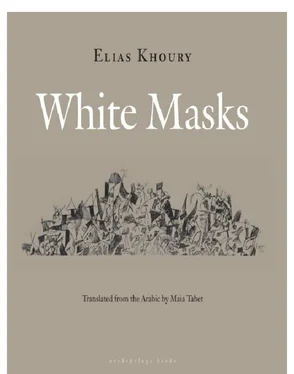Except that when they found him, there was no coat. He was naked from the waist up and riddled with bullets — his face torn up, his mouth open, his teeth smashed, and the coat gone. No one asked about the coat.
And Fatimah remained alone, with her seven children, the eldest always gone, going up to Mr. Basheer al-Harati’s apartment every morning and coming back down in the evening, sweeping the lobby, cooking for the children, and saying very little.
Sitt Elham asked her once why she said nothing. Fatimah didn’t know what to answer, she just shook her head, which made her hair fall across her face. “And why haven’t you got your white wrap on?”
So Fatimah smoothed her hair back and went downstairs to get her white headwrap.
“But you never say anything.” Fatimah just smiled, baring her glistening white teeth.
No one notices anymore that she hardly ever speaks — even Sitt Elham has stopped mentioning it.
Her work done, and the children asleep, Fatimah stands in the doorway of her little room — having repaired both the door and the lobby — and gazes into the distance. Gazing out in silence, she sees a white man, holding a white stick, coming toward her.
The clatter of the ancient truck lumbering through the hazy Beirut morning. The sea, the mingled smells of saltwater and fish. . Sky, gray clouds, waves… Engine clacking, wheels pitching the ruts, the truck rumbles along. Zayn ’Alloul is sitting next to the driver up front. Mohammad al-Kharoobi and Saleh Ahmad are crouched on two small fenders at the back-end of the vehicle. The aroma of Virginia blend suffuses the front cabin: the driver, known as Nabeel al-Hallaq — Nabeel-the-barber, is smoking. Finding this unpleasant, Zayn fans his face with his hand to try and disperse the smoke, but it still penetrates his nostrils. When he coughs and opens his window, the chill air is like a slap on the face. Rolling the window shut, he turns to the driver:
“Now, really, tell me, is this normal — to be smoking at four in the morning?”
The driver looks at him unperturbed, inhales deeply, and carries on driving. Zayn ’Alloul opens the window once more and breathes in the sea air while the vehicle rumbles on its way.
Thank goodness, things are back to normal: a big city like Beirut with no garbage collection and rats practically eating people alive doesn’t bear thinking about! Zayn’s neighbor, in Hamra, reported seeing a rat as large as a cat once. Zayn told him it was because of the garbage everywhere. The neighbor, an old Beiruti who runs a juice shop on Hamra Street, claimed that he’d seen rats crawling out of the sea!
“I tell you, I saw them with my own eyes! Can you believe it, rats actually swimming in the sea and then coming ashore? No way to eat fish these days, it’s out of the question! No wonder people get sick after eating fish. . The fish are being bitten by disease-infested rats!” Zayn himself doesn’t believe that matters have come to quite such a critical pass; at any rate, he’s not all that bothered about it. Grumbling comes naturally to most people but, as he likes to say, the poor too have to live, and dirt is like a vaccine.
The thought brings to mind the pediatrician at the American University Hospital who found it difficult to believe that Zayn hadn’t had his son vaccinated against polio — though he found it easy enough to pocket his fifty-lira note! Holding the baby in his arms, Zayn tried to explain to the doctor that he had seven children — and none of them was immunized. The doctor, appalled, spoke to Zayn curtly.
“But dirt is a natural vaccine, doctor,” the nurse butted in. “It strengthens one’s immune system.”
“We are not dirty, ma’am,” Zayn told her. “We’re cleaner than you are.”
It’s true though, and the nurse was right, dirt acts like a vaccine. His mother was always telling him to let the children play in the sand. “But they’ll put it in their mouth, Mother. . Think of it, all that dirt!”
“It’s pure penicillin, son. Let them be. Penicillin is a kind of mold, and dirt is pretty moldy. Leave them alone.”
“Mother, that makes no sense.”
“It’s true though. The nurse told me all about penicillin.”
So he lets the children be, and his mother prattles on about the olives up in the village. Zayn does his best to comfort her. He tells her it’s very dangerous to go up there at the moment, because of the shelling everywhere.
“You can’t possibly tend the olive trees under these circumstances.”
But she simply doesn’t understand.
“I’m going anyway, my dear,” she tells him, reclining in bed.
A partial stroke has left her bedridden, with a strangely lopsided face, a twisted mouth and a semi-paralyzed arm. And then there’s Husniyyah, his wife, constantly complaining that it’s becoming intolerable to live like this, and him trying to calm things down.
Honestly, all this talk about life being intolerable! Zayn thanks the good Lord that they all managed to escape Naba’a 3alive during the fighting — before it was overrun, and all those atrocities took place. Initially, they fled to the village, and when they returned to Beirut, they found a place to stay in Hamra. Now, honestly speaking, how could Naba’a possibly be better than Hamra? True, there they had their own house, even though it was a rental, and here they’re only refugees… But at least now there’s no rent to pay, and what’s more, here it’s a building, a high-rise — even though there is the landlord, damn him and his petty ways, . always coming around to “inspect” the building, casting sideways glances at everybody, as if we had the plague, and disapproving of the laundry hanging from the balconies! What does he expect, that the clothes should remain unwashed? He says it mars the beauty of the building! I suppose he thinks we should be dirty so the view can remain unspoiled! Still, when all’s said and done, Hamra’s better than Naba’a: there the house was small, just one room and a poky kitchen; here it’s large and airy. There are three rooms — two bedrooms and a living room — plus it’s furnished. . fridge, stove, armchairs, all the modern conveniences you could want. . All of that, and still Husniyyah says that life in Naba’a was better!
“There, people were human beings at least!”
Well, what to do? They can’t return to Naba’a, and living in the village is out of the question.
The only thing that bothers Zayn ’Alloul about their new home is the movie theater on the first floor of the building: its lurid posters of naked women, and the laughter and raucousness into the early hours, they’re truly a thorn in his side. “We’re decent people, we are with young daughters!”
The smoke from the American cigarettes envelops the front cabin, as the truck plods along the blue-gray and seemingly endless shore. Joggers, in navy track suits or shorts, gradually emerge, some running, others walking briskly, with their heads held high and their arms swinging vigorously back and forth. The early-morning stillness is broken only by the noise of the passing truck and the rolling sea.
“What do they do out here every morning?” the driver asks.
“Exercise, man, exercise,” Zayn tells him. “I’m no expert, but doctors say people should jog so they won’t get fat. . It’s just another fad of these cursed times!”
“You know Jameel? The son of Imm Mohammad as-Saqa — he was big as a bull, they thought it was his glands, but the doctor told him the only solution was jogging… So out he went out and bought one of those navy track suits. . What a wimp he turned out to be: he did it a few times then stopped, because he couldn’t face getting up that early — at any rate, that’s what people said!”
Читать дальше












